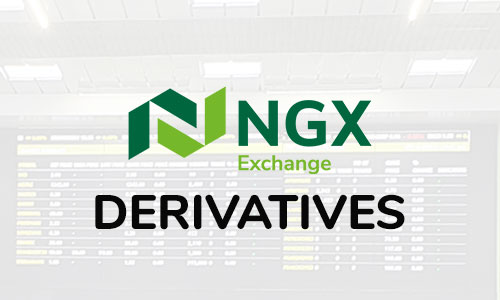Nigerian Exchange Limited (NGX or The Exchange) is pleased to announce that it has received approval for seven derivatives contracts from the Securities and Exchange Commission (SEC) on Monday, 28 June 2021. The approved contracts are Access Bank Plc Stock Futures, Dangote Cement Plc Stock Futures, Guaranty Trust Bank Plc Stock Futures, MTN Nigeria Communications Plc Stock Futures, Zenith Bank Plc Stock Futures, NGX 30 Index Futures, and NGX Pension Index Futures.
This announcement follows the successful registration of NG Clearing by SEC, as a premier Central Counterparty, effective 7 June 2021. With these approvals, NGX is inching closer to launch West Africa’s first Exchange Traded Derivatives supported by NG Clearing in the risk management process.
Ahead of the launch of derivatives, the Chief Executive Officer, NGX, Mr. Temi Popoola, CFA, noted that “The launch of the derivatives market aligns with our commitment to building a market that thrives on innovation and responds to the needs of stakeholders in accessing and using capital. We are, therefore, excited about the prospects of deepening Africa’s position in the global financial markets through ETDs, as well as enhancing liquidity and mitigating against price, duration, and other financial risks that may arise from sophisticated financial transactional activities.”
Leading up to the launch of ETDs in the market, NGX has continued to ensure a widespread understanding of derivatives, its applicability, and how investors can reap maximum value from the asset class. NGX has collaborated with both local and international organisations such as SEC, JPMorgan Chase, CBOE Options Institute, and NG Clearing to facilitate in-depth capacity-building programs on the derivatives market. In addition, through its learning and development arm, X-Academy, NGX has hosted training programs to prepare capital market players who wish to undertake the Chartered Institute for Securities & Investment UK Global Derivatives qualification exam and is on track to host further training for other stakeholders in the near term.
A derivative is a contract between two or more parties whose value is based on an agreed-upon underlying financial asset or group of assets. Common underlying instruments include bonds, commodities, currencies, interest rates, market indices, and stocks. The basic principle behind a derivative contract is to earn profits by speculating on the value of the underlying asset at a future date. As such, derivatives are used as a risk management instrument and are suited to both professional and private investors who wish to hedge an open position or gain exposure to assets and markets without necessarily holding the underlying assets. ?ETDs are variants of derivatives traded on an organised securities exchange as against those other derivatives traded through informal over-the-counter (OTC) markets.

